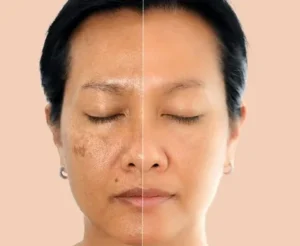How to Get Rid of Dark Spots: Hyperpigmentation
Learn how to get rid of dark spots and hyperpigmentation with effective treatments like Vitamin C, retinoids, and natural remedies. Achieve clear, even skin with these proven solutions.
Hyperpigmentation is one of the most common skin concerns, and it can affect anyone regardless of age, gender, or skin type. Dark spots, often referred to as age spots, sun spots, or melasma, are caused by the overproduction of melanin in the skin. While these spots are usually harmless, they can be frustrating and challenging to treat. If you’re looking to lighten these dark spots and achieve a clearer, more even complexion, you’re in the right place.
In this guide, we’ll walk you through effective treatments and natural remedies for fading dark spots, including both topical treatments and lifestyle changes. Whether you’re dealing with post-acne scars, sun damage, or hormone-induced pigmentation, these solutions will help you regain your glowing skin.
What Causes Hyperpigmentation?
Hyperpigmentation occurs when the skin produces more melanin than usual, leading to darkened areas on the skin. There are several causes of hyperpigmentation:
-
Sun Exposure: The most common cause, excessive sun exposure triggers the skin to produce more melanin to protect itself from UV radiation.
-
Hormonal Changes: Conditions like pregnancy or the use of birth control can cause melasma, a type of hyperpigmentation that appears on the face.
-
Post-inflammatory Hyperpigmentation (PIH): This occurs after a skin injury, such as acne, eczema, or a wound, as the skin heals.
-
Aging: Age spots, also known as liver spots, develop as the skin ages and is exposed to the sun over time.
How to Treat Hyperpigmentation: Topical Solutions
To treat hyperpigmentation effectively, it’s essential to use ingredients that target melanin production and promote skin cell turnover. Below are some of the best topical solutions you can use to lighten dark spots.
1. Vitamin C Serum
Vitamin C is an antioxidant powerhouse that helps brighten the skin and reduce the appearance of dark spots by inhibiting melanin production. It also helps promote collagen production, which can aid in overall skin rejuvenation.
How to use: Apply a Vitamin C serum after cleansing and before moisturizing in your morning routine. Look for formulas with stabilized forms of Vitamin C like ascorbic acid or sodium ascorbyl phosphate for best results.
2. Retinoids
Retinoids, derived from Vitamin A, are among the most potent treatments for hyperpigmentation. They work by accelerating skin cell turnover, which helps shed pigmented skin cells and reveal newer, brighter skin.
How to use: Start by incorporating a retinoid cream into your nighttime skincare routine, gradually increasing the frequency of use to avoid irritation. Retinoids are best used at night since they can make your skin more sensitive to sunlight.
3. Niacinamide (Vitamin B3)
Niacinamide is another excellent ingredient for reducing hyperpigmentation. It works by inhibiting melanin transfer to skin cells, thus preventing the formation of dark spots.
How to use: Apply a niacinamide serum or moisturizer to affected areas after cleansing, both in the morning and at night. It’s a gentle ingredient, so it can be used daily.
4. Hydroquinone
Hydroquinone is a skin lightening agent that can significantly reduce the appearance of dark spots. It works by inhibiting the enzyme responsible for melanin production in the skin.
How to use: Hydroquinone is available over-the-counter in lower concentrations (2%) or in higher concentrations through a prescription. Be sure to use sunscreen, as hydroquinone can make your skin more sensitive to UV rays.
5. Alpha Hydroxy Acids (AHAs)
AHAs, such as glycolic acid, exfoliate the skin by removing dead skin cells, promoting the growth of fresh, new skin. This helps fade dark spots and can make your skin look more radiant.
How to use: Use an AHA-based toner or serum in your skincare routine a few times a week. Always apply sunscreen during the day, as AHAs can increase sun sensitivity.
6. Licorice Extract
Licorice extract has natural skin-lightening properties, and it’s gentle enough to use on sensitive skin. It helps brighten dark spots and even out skin tone.
How to use: Look for moisturizers or serums containing licorice extract and apply them after cleansing, both morning and night.
How to Treat Hyperpigmentation: Natural Remedies
If you’re looking for more natural treatments, there are several remedies you can try at home. Keep in mind that natural remedies tend to take longer to show results compared to clinical treatments.
7. Aloe Vera
Aloe vera has soothing properties that can reduce skin inflammation and promote healing. It also helps fade dark spots by lightening skin pigmentation.
How to use: Apply fresh aloe vera gel directly to your dark spots, leaving it on for about 15-20 minutes before rinsing it off.
8. Green Tea Extract
Green tea is rich in antioxidants and can help calm the skin. It has also been shown to reduce pigmentation caused by UV exposure.
How to use: You can apply green tea extract directly to your skin or use green tea bags as a compress. Let the tea cool and apply it to your face for 10-15 minutes.
9. Lemon Juice
Lemon juice contains citric acid, a natural exfoliant that can lighten dark spots over time. However, be cautious, as lemon juice can make your skin sensitive to sunlight, leading to further pigmentation if not used correctly.
How to use: Dilute lemon juice with water and apply it to the affected areas for a few minutes. Follow up with sunscreen during the day.
10. Apple Cider Vinegar
Apple cider vinegar contains acetic acid, which can help lighten dark spots and improve skin tone. It also has exfoliating properties.
How to use: Mix equal parts apple cider vinegar and water and apply it to the dark spots using a cotton pad. Rinse off after a few minutes.
Lifestyle Tips to Prevent Hyperpigmentation
While topical treatments are important, you can also take steps in your daily life to prevent hyperpigmentation from worsening or recurring.
11. Use Sunscreen Daily
Sun exposure is a primary cause of hyperpigmentation. To prevent dark spots from forming or worsening, it’s crucial to apply sunscreen daily, even on cloudy days.
How to use: Look for a broad-spectrum sunscreen with an SPF of 30 or higher. Apply it every morning and reapply throughout the day, especially if you’re spending time outdoors.
12. Avoid Picking at Pimples
Picking at acne or other skin injuries can cause post-inflammatory hyperpigmentation. Try to resist the urge to touch your face to prevent scarring and dark spots from forming.
13. Stay Hydrated
Drinking plenty of water helps keep your skin hydrated and can aid in the healing process. When your skin is well-hydrated, it’s better able to repair itself and fade dark spots.
14. Eat a Healthy Diet
A diet rich in antioxidants, vitamins, and minerals can help improve your skin’s health. Foods like berries, leafy greens, and citrus fruits can help reduce inflammation and promote skin healing.
When to Seek Professional Help
If over-the-counter treatments aren’t giving you the results you want, or if your hyperpigmentation is particularly stubborn, it may be time to consult a dermatologist. Some professional treatments include:
-
Chemical Peels: These exfoliate the skin deeply, helping to fade dark spots and reveal fresh skin.
-
Laser Treatments: Lasers can target deep pigmentation and reduce the appearance of dark spots.
-
Microneedling: This treatment stimulates collagen production and can help fade hyperpigmentation by promoting skin renewal.
Conclusion
Getting rid of dark spots caused by hyperpigmentation requires patience and consistency. By using the right skincare ingredients, incorporating natural remedies, and protecting your skin from the sun, you can gradually lighten dark spots and achieve an even complexion. Remember, it’s important to be consistent with your skincare routine and, when in doubt, seek advice from a dermatologist.

FAQs
1. How long does it take to get rid of dark spots?
It typically takes 4-6 weeks to see noticeable improvements in dark spots, depending on the treatment used. Be patient and consistent.
2. Can hyperpigmentation come back after treatment?
Yes, hyperpigmentation can return if you don’t protect your skin from the sun or continue your treatment routine. Always wear sunscreen to prevent recurrence.
3. Is hyperpigmentation dangerous?
No, hyperpigmentation is generally not harmful to your health. It is a cosmetic concern, though it can be emotionally frustrating for many.
4. Can I use natural remedies for dark spots daily?
Yes, most natural remedies like aloe vera and green tea can be used daily, but always test them on a small area of skin to ensure you don’t have an allergic reaction.
5. Should I avoid retinoids if I have sensitive skin?
If you have sensitive skin, start with a lower concentration of retinoids and apply them less frequently until your skin builds tolerance. If irritation persists, consult with a dermatologist.
By using the tips and treatments above, you can take steps to fade hyperpigmentation and enjoy brighter, more even skin



